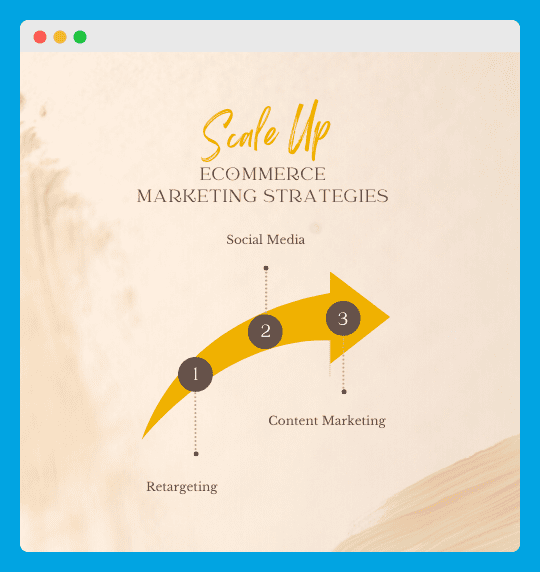Ecommerce Marketing Strategies
If you are an e-commerce brand, you need an e-commerce marketing strategy to attract new customers and to encourage old customers to return to your business. Development of a marketing strategy for e-commerce is not only about boosting sales but also about improving customer experience, brand awareness and building lasting relationships with your customers.
As your online retail business begins to maintain an established customer base, it's important to stay updated with the latest trends and techniques in ecommerce marketing for your business. As part of your customer journey, use consumer buying trends and feedback to secure customers and plan a number of marketing touchpoints to boost your product sales. Knowing how customers move through your sales process will help you develop the best possible e-commerce marketing strategy.
To build brand awareness, drive traffic and drive sales, you need a solid, comprehensive and effective e-commerce marketing strategy . On this page we take a look at some of the best e-commerce marketing strategies and how to use them to attract potential customers and increase revenue.
YouTube Videos For Marketing
By sharing content that appeals to your target audience on social media, will help new customers to find your website and it also builds loyalty with to existing customers. Implementing YouTube as part of your e-commerce marketing strategy can help increase customer satisfaction and build long-term relationships with visitors to your website.
Social Media Marketing
Social media marketing is one of the most effective online strategies for e-commerce websites. This means that you can attract the right consumers into your online store and connect them to their favorite products by using the right social media and e-commerce marketing tactics.
Social media advertising on popular social networks is a useful tool for brands and marketers to offer targeted advertising to potential customers. Marketing is the way you direct traffic and sales to your online shop and can include things such as advertisements, organic social media posts, email campaigns and promotions on your own website.
One such social media marketing tactic that has gained traction and can-do wonders for your e-commerce marketing strategy is Facebook and Instagram videos, which are a great way for e-commerce companies to interact with their customers in real time and reach a wider audience.
Google Shopping Campaigns
Google shopping campaigns if managed properly can also help you lead to up to 200% more conversion and click-through rate (CTR) from consumers who interact with a particular brand, add a product to their shopping cart or browse product categories. Good marketers know what customers are buying, and customers know that if you remind them of your brand and the products they are looking for, that is the most effective way for them to transform. While social media content marketing and email marketing are typical e-commerce marketing strategies, offline marketing tactics such as billboards, posters and handouts to attract attention to your online store should also be considered in an e-commerce marketing strategy.
Content Marketing
The primary goal of using content in an e-commerce marketing strategy is to educate potential customers about your products and services and to generate brand awareness. Content marketing can convince your current customers to buy a product and it can also help brand new leads find your products. If you want you can also take inspiration from other e-commerce websites, but its very important that you use your own original content and marketing strategy that is relevant, informative, crisp and creative.
Content marketing tactics can deliver long-term results for e-commerce companies. They ensure that the target group is involved and that potential customers express an interest in hearing from your brand.
Word Of Mouth Strategy
Word-of-mouth marketing tactics get your audience to spread out information about your products through customer reviews, recommendations and user-generated content.
Retargeting Your Existing Customers
Using existing customers to implement retargeting into your e-commerce marketing strategy is a great way to sell new and additional products and remind shoppers why they gave up shopping. You can use email in a variety of ways, from brand introduction, information about new products, to insights into overall e-commerce market share and brand news.
With a personalization strategy, you can reach out to customers with tailored and dynamic offers, discounts and personalized e-mails that recommend products that help them feel understood and help them find what they need.
They can receive tailor-made and dynamic offers (sale, personalized e-mails, even recommended products) that make them feel understood and also help them find what they need by observing and analyzing customer behavior on the website, shopping cart history and demographic specific history data. Cookies, cross-device tracking, user IDs and customer logins help brands use consumer information contained in their analytics and POS system to provide personalized ads, recommendations and informative content. Successful e-commerce marketing strategies work because customers are drawn to brands due to the quality of their content.
Affiliate Marketing
In reality, the best e-commerce marketing strategies aim to provide their customers a seamless experience that meets their needs and requirements. Affiliate marketing is conducted through blog posts in which a network of affiliate referrers who direct traffic to your online store and pay for the sales that help them talk about your products and list their recommendations in specific categories. These strategies connect e-commerce companies with the products they sell and the marketers who are willing to sell them.






